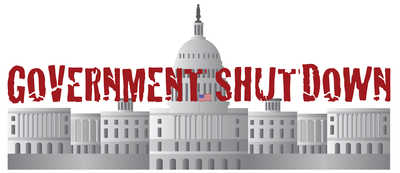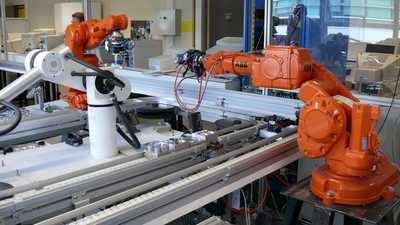| Home | About | Archives | RSS Feed |

@theMarket: Should Be Good Month for Stocks
 |
The House passed a stop-gap spending bill averting a government shut-down late Thursday night. As a result, markets moved higher. We can expect more of the same until the next deadline, which is just before Christmas.
To be honest, investors have become so used to these eleventh hour deals out of Congress that the markets hardly budge when the drama begins. Dec. 22 is the new date investors will be watching. We will see whether a compromise can be reached on the budget for 2018 by then.
In the meantime, the markets will remain focused on the Republican tax deal. The hope is that a compromise between the House and Senate will be reached in time for President Trump to sign it into law by Christmas. The stop-gap move by the House now frees the decks for legislators to focus on tax reform between now and then.
Next week, the Fed meets again. Investors are expecting another Fed Funds rate hike by the end of the FOMC meeting next Wednesday. That will make three this year. There should be no surprises there, since traders have been expecting such a rate hike for weeks now. The only risk may be if Janet Yellen, the Fed chairwoman, says something unexpected during her remarks after the announcement.
In the meantime, the markets are seeing quite a bit of rotational activity. While the indexes may appear to be simply consolidating across time, individual stocks and sectors are undergoing some gut-wrenching moves. This week energy, financials, technology and utilities, among others, have seen their values gyrate based on what investors perceive as under or overvalued.
At the same time, overseas markets have been correcting as well. Emerging markets and Europe, over all, have seen 2-3 percent declines recently as investors are taking some profits in those areas. Stock markets there have done exceptionally well this year. The truth is that foreign markets have been outperforming the U.S. markets ever since the elections.
Some pundits are worried by the price action. Since foreign markets have led the U.S. stock market up in price action this year, their present declines may be a forerunner of future declines here at home. If so, I do not believe we will see any fall out until January at the earliest. There are just too many seasonable and fundamental factors that will keep U.S. markets propped up or gaining for the rest of the year.
Tax reform itself has contributed mightily to the lack of tax loss selling this season. This has provided a great deal of support to the averages and will continue to do so until the end of 2017. And then there is the Santa Claus Rally that will soon be upon us.
Combined with a good economy, low interest rates, and low unemployment, this gives most investors few reasons to sell.
As a result, the stock market should close out the year at these levels or higher. Next year may not be as positive, but we will worry about that when the time comes. In the meantime, count your shekels.
Bill Schmick is registered as an investment adviser representative and portfolio manager with Berkshire Money Management (BMM), managing over $200 million for investors in the Berkshires. Bill's forecasts and opinions are purely his own. None of the information presented here should be construed as an endorsement of BMM or a solicitation to become a client of BMM. Direct inquiries to Bill at 1-888-232-6072 (toll free) or email him at Bill@afewdollarsmore.com.
The Independent Investor: Will the Lights Go Out?
 |
The deadline looms. There is no deal in sight. Various political factions are jockeying to get their demands met. It is all part of an annual compromise to fund the government for another year.
So what else is new?
If the government does shut down on Saturday morning, it will be the 18th such occurrence in U.S. history. In every case, the nation has survived, although at times the cost has been great. There was, for example, a 16-day shutdown back in 2013 that resulted in a $24 billion hit to economic output and caused 850,000 workers to be laid off.
We all know it costs the American people more to shut down the government than it does to keep it open. In this age of partisan politics, where compromise is a rare commodity, the drama of a government shutdown goes on year after year. At the 11th hour, a series of horse trades normally occurs, allowing both sides to kick the can down the road for a little while longer until the next deadline looms.
You might have thought that with a Republican-controlled House, Senate and presidency, that passing a spending bill would have been smooth sailing. Far from it, readers may recall that in years past, the Republicans have controlled the House, but the threat of closing the government occurred anyway. That's because there are so many splinter groups within the GOP that there is always someone or some faction that insists on more or less spending; usually more on defense and less on everything
else.
In the Senate, although the Republicans hold the majority of seats (52), you still need 60 votes to pass a spending bill. That requires the cooperation of eight Democratic Senators. To get their votes, the Democratic leadership wants legislation passed that would protect "The Dreamers" from deportation. Those 700,000-plus illegal immigrants who were brought to the U.S. as young children and are now caught up in the web of President Trump's animosity towards all immigrants, legal or otherwise.
The Democrats also want to reverse Trump's decision to halt monthly subsidy payments to insurance companies offering health care to low-income people. Those demands fly in the face of ultraright Republicans, many of whom want spending cut (except for defense) in all social programs, especially those involving Obamacare and immigrants.
Thursday, President Trump and Republican congressional leaders were meeting with Chuck Schumer, the Senate's Democratic Leader, and Nancy Pelosi, his counterpart within the House.
The betting is that they will all agree to disagree, but extend the existing spending bill by two weeks.
That would enable the GOP to finish up their tax package before re-focusing on a spending plan.
If so, that would simply kick the can down the road to just before Christmas. Given that only 18 percent of voters would go along with even a temporary shutdown of the government, the hope is that our legislators would be loath to cause a shutdown during the holiday season.
I am not sure I agree with that. The Republicans seem oblivious to voter sentiment. Their tax bill has less than a 30 percent approval rating among Americans, who rightly believe the "tax cuts" benefit the rich and corporations, while savaging most other Americans. Both the president and his party have their own end game, which does not include the majority of voters.
However, even if we do see another shutdown, the impact will be short-lived both for the economy and the markets. Maybe that is what the Republicans are counting on.
Bill Schmick is registered as an investment adviser representative and portfolio manager with Berkshire Money Management (BMM), managing over $200 million for investors in the Berkshires. Bill's forecasts and opinions are purely his own. None of the information presented here should be construed as an endorsement of BMM or a solicitation to become a client of BMM. Direct inquiries to Bill at 1-888-232-6072 (toll free) or email him at Bill@afewdollarsmore.com.
The Independent Investor: The Bots Are Coming
 |
One no longer needs to imagine a post-apocalyptic world where humans are hunted into extinction by intelligent robots. While a shooting war may not break out between the two sides before 2030, a new study by the McKinsey Global Institute indicates that as many as 375 million human workers will be replaced by automation.
Most readers are already aware that companies using high degrees of automation, such as Amazon, are decimating the brick and mortar method of selling products. Most analysts believe it is inevitable that this trend will extend to all kinds of products. Pharmaceuticals and food are just the most recent items to be transitioned over to the internet. While this will add convenience, lower prices, and speedy delivery to consumers, it comes at a cost. That cost is in the loss of jobs.
This new study by the McKinsey Global Institute predicts that this trend will continue. Jobs most at risk will be those that require physical activity. Everything from lathes to tractors will become automated, putting most machinery operators out of work. But it doesn't stop there.
Fast food services of all kinds will no longer need human help. Bank tellers, data collection and all types of processing services will also succumb to automation. Humans involved in back-office processing throughout myriads of industries will no longer be needed. Nor will many financial occupations from mortgage origination, paralegals to maybe even elements of money management.
Many of those developments are already happening, but the pace of change will accelerate. One can only imagine the consequences worldwide if workers simply do nothing but await their fate. What will be necessary, according to the study, is for both the private and public sector to embark on an enormous and lengthy program of re-training. It will require decades to transition those vulnerable workers, to teach them new skills in order to land tomorrow's jobs.
In an ironic twist of fate, some professions that have been scoffed at for decades could turn out to be the most lucrative job opportunities down the road. While many of my clients wring their hands over the high cost of a college education for their children, some are starting to wonder if a college degree is really worth the cost. Vocational schools are far cheaper and the starting salaries for many grads outstrip those with a college degree (depending on the major).
Most of us are already aware that the demand for some professional services is outstripping supply. Just try and find an electrician who can show up when you need one. Trades like plumbing, carpentry, landscaping and those that provide elder and child-care, among others, are already in high demand. The McKinsey study believes that will continue. Wouldn't it be something if, at some point in the future, plumbers will earn more than money managers or lawyers?
Some skills, such as managing people, those skilled in social interactions, professional sales or applying a specific expertise will probably never be replaced by robots. But that does not mean that those workers can rest on their laurels. The days when you could get out of school, enter the work force and never look back are already over.
If you are like me, you spend a good portion of your year attending various continuing education courses just to keep up with the changes in your profession. Just a week ago, as an example, our entire company spent the week in Chicago attending various courses on investment, estate planning, financial planning and more.
The fact that this trend is already spreading throughout this country should not be lost on any of us. Today, there are hundreds of thousands of jobs that remain vacant simply because there are no skilled workers to fill them. In order for this to change, a concerted effort by both corporations and the government must be put into place. Is anyone listening?
Bill Schmick is registered as an investment adviser representative and portfolio manager with Berkshire Money Management (BMM), managing over $200 million for investors in the Berkshires. Bill's forecasts and opinions are purely his own. None of the information presented here should be construed as an endorsement of BMM or a solicitation to become a client of BMM. Direct inquiries to Bill at 1-888-232-6072 (toll free) or email him at Bill@afewdollarsmore.com.
|

